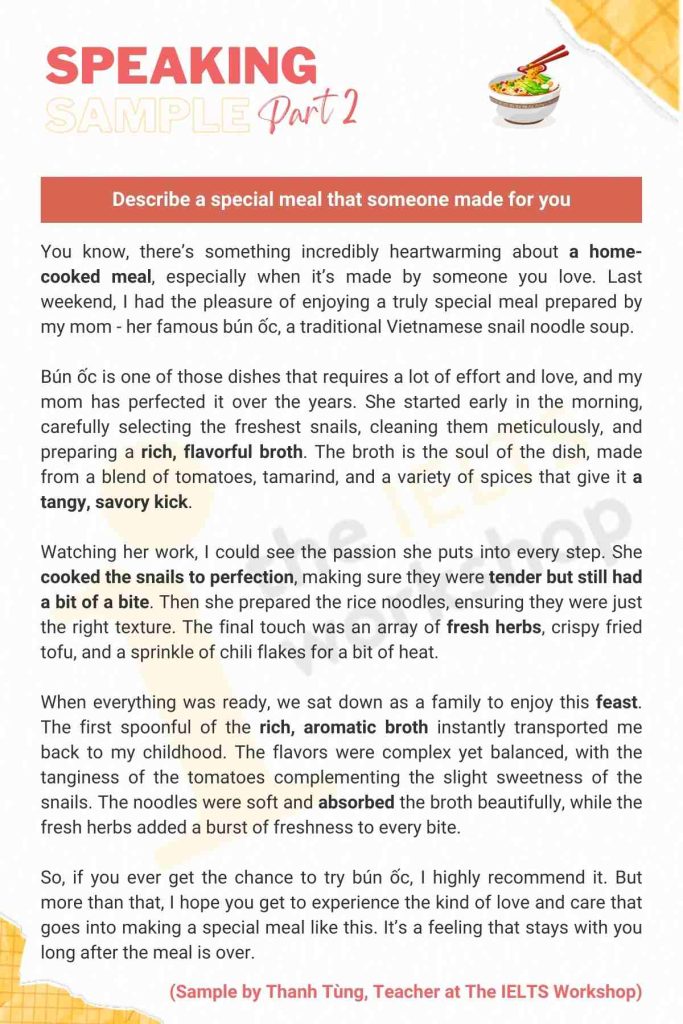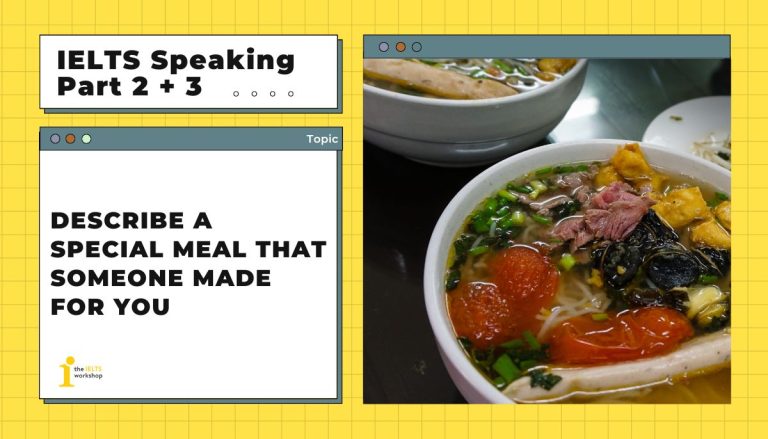Trong chuyên mục giải đề IELTS Speaking kỳ này, cùng tham khảo bài mẫu của thầy Thanh Tùng từ The IELTS Workshop với chủ đề: “Describe a special meal that someone made for you”. Cùng tham khảo tự vựng và các cấu trúc ghi điểm nhé.
Part 2: Describe a special meal that someone made for you
Describe a special meal that someone made for you
You should say:
Who did it
When and how he/she cooked
What and why he/she cooked for you
And explain how you felt about the meal
Dưới đây là bài mẫu cho topic “Describe a special meal that someone made for you”.
1. Bài mẫu (Sample)

2. Từ vựng (Vocabulary)
- a home-cooked meal: bữa cơm nhà nấu
- a feast: bữa tiệc, bữa ăn ngon
- fresh herbs: các loại rau gia vị, rau sống ăn kèm
- broth: nước dùng, nước lèo
rich, savory, flavorful, aromatic broth: nước dùng đậm đà, thơm ngon - to cook something to perfection: nấu vừa chín tới
- kick: vị, vị mạnh, vị cay
the tangy kick of tamarind: vị chua của me
add chili paste for a bit of a kick: thêm tương ớt cho cay
Part 3
Should students learn to cook at school?
Do you think people’s eating habits would change as they get older?
Do people in your country like to learn to cook from TV programmes?
What kinds of fast food are popular in Vietnam?
Are there any people who wouldn’t eat meat for their whole lives?
What do you think about vegetarians?
1. Should students learn to cook at school?
Absolutely! Cooking is a vital life skill that promotes independence and healthy living. By learning to cook, students can understand nutrition better, make healthier food choices, and become self-sufficient. It also encourages creativity and can be a fun, engaging way to learn about different cultures through their cuisines. Moreover, cooking classes can teach valuable skills like time management, following instructions, and even budgeting when it comes to planning meals. Overall, integrating cooking into the school curriculum can have long-lasting benefits for students’ personal and professional lives.
- nutrition (n): dinh dưỡng
- cuisine: nền ẩm thực
2. Do you think people’s eating habits would change as they get older?
Definitely! As children, people might prefer simpler, sweeter, or more familiar foods. However, as they grow, their palates tend to become more sophisticated, and they might start to appreciate a wider variety of flavors and cuisines. Additionally, health considerations become more important with age. Older individuals might adjust their diets to manage health conditions, maintain weight, or boost their energy levels. Lifestyle changes, such as starting a family or having a busier work schedule, can also influence eating habits, pushing people towards more convenient, sometimes healthier options.
3. Do people in your country like to learn to cook from TV programs?
Yes. Cooking shows are quite popular because they make learning new recipes and techniques accessible and entertaining. Famous chefs and food experts often share their tips and secrets, which can inspire viewers to try new dishes. These programs also showcase a variety of cuisines from around the world, broadening people’s culinary horizons. Additionally, the visual aspect of TV cooking shows makes it easier for viewers to follow along and replicate the steps at home. Overall, cooking shows are a great resource for both novice and experienced cooks.
- recipe: công thức món ăn
- culinary (a): liên quan đến nấu ăn
culinary school: trường dạy nấu ăn, culinary skill: kĩ năng nấu ăn - a cook: đầu bếp
4. What kinds of fast food are popular in Vietnam?
In Vietnam, a variety of fast food is popular. Western fast foods like burgers, fried chicken, and pizza have a strong presence, with major chains like McDonald’s, KFC, and Pizza Hut being quite popular. However, Vietnamese fast food also thrives, with dishes such as bánh mì, sticky rice meals, and various noodle soups being favorites. Street food is another significant part of the fast food culture in Vietnam, with items like skewered meat, salads, and sweet soups. The diversity in fast food options reflects the blend of traditional and modern influences in Vietnamese culinary preferences.
5. Are there any people who wouldn’t eat meat for their whole lives?
For sure. Vegetarians and vegans avoid meat for various reasons, including ethical concerns about animal rights, environmental sustainability, and health benefits. Some people are raised in families or cultures where vegetarianism is the norm, while others may adopt it later in life due to personal beliefs or dietary needs. In many parts of the world, vegetarianism is a well-established practice, and there is a growing awareness and acceptance of plant-based diets globally.
- vegetarianism: thuyết ăn chay
- dietary (a): liên quan đến chế độ ăn
dietary habits: thói quen ăn uống, dietary requirements: ăn kiêng
6. What do you think about vegetarians?
I think vegetarians make a commendable choice for various valid reasons. Many vegetarians adopt their diet out of concern for animal welfare, which reflects a compassionate and ethical mindset. Others choose vegetarianism for environmental reasons, as reducing meat consumption can lower one’s carbon footprint and conserve natural resources. Additionally, some people find that a vegetarian diet offers numerous health benefits, such as lower risks of heart disease and certain cancers. Overall, vegetarians often lead by example in promoting sustainable and healthy living practices. I respect their commitment and believe that their dietary choices contribute positively to both personal well-being and the broader community.
Bài mẫu bởi thầy Thanh Tùng – Giáo viên The IELTS Workshop
Trên đây là bài mẫu cho topic: Describe a special meal that someone made for you. Các bạn có thể tham khảo các bài mẫu IELTS Speaking Part 2 khác của The IELTS Workshop tại đây!
Ngoài ra, khoá học Senior của The IELTS Workshop sẽ giúp bạn nâng cao kỹ năng cũng như xây dựng chiến lược trả lời câu hỏi, tham khảo ngay nhé!!









